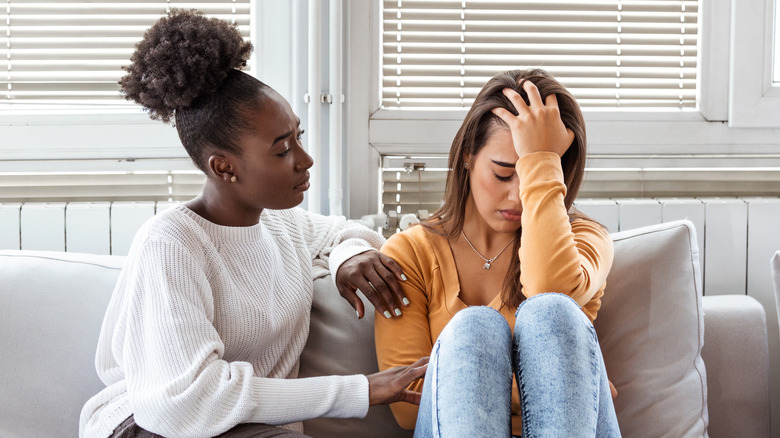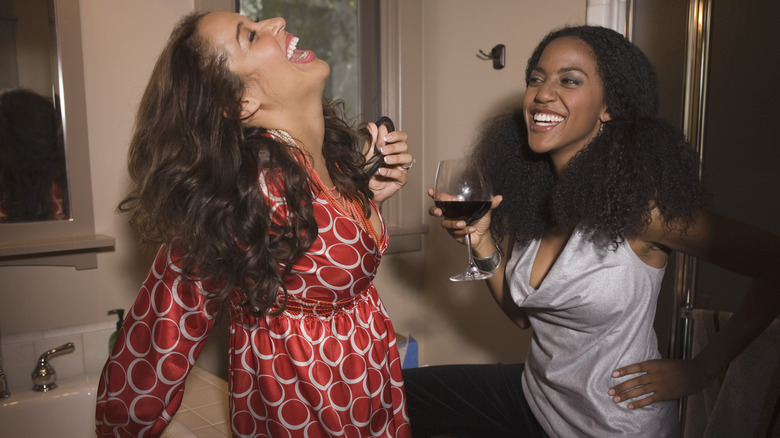Subtle Signs You Might Be A Bad Friend
Friendships aren't just about having someone who gets you and always has your back. But there's a boatload of health benefits involved with having them, too. According to the Mayo Clinic, friendships can increase happiness and decrease stress and anxiety. They can also boost our self-confidence and give us a sense of belonging. Friends encourage us to make healthier and wiser choices for ourselves and help us during times of emotional struggles. But while this is great news for friendships everywhere, you can't really reap these benefits if you're a bad friend.
Friendships involve giving pieces of yourself to someone else and accepting pieces of them in return. It means loving them unconditionally and always being there for them. If you can't do that, if you don't have what it takes to be a good friend, then you can kiss the benefits of a friendship goodbye. That's why here and now, you need to acknowledge where you fall on the friendship spectrum because life is too short to only give 50% to someone giving you 100%.
You silently judge them
Friendships should never involve judgment. When a friend comes to us to share something that's happened, whether it's good, bad, weird, or embarrassing, they do so because they believe that your friendship is a space where everything is free of judgment. Your friend is confessing to you something they wouldn't tell a casual acquaintance because they believe in your ability never to shame them — even if they expose the very worst of themselves to you.
While sometimes what a friend might say can be shocking, surprising, or even upsetting for you, any sort of judgment or shame shouldn't exist. A good friend says they're not judging and means it. They actually feel at the core that there is zero judgment. But a bad friend? They may say they're not judging, but deep down they often are.
If you don't want to be judged for anything you do, especially the darkest things that you'd only tell a close friend, then you shouldn't judge a friend for whatever they do. People aren't perfect. Mistakes, strange behavior, rash decisions — this all comes with the territory of being human. If you're secretly judging your friend for anything they do or say, then it's time to ask yourself why, especially if you expect them to never judge you.
You keep score
All relationships are give and take, platonic relationships included. When one friend is short on cash, the other friend picks up the tab and does so without making a big deal of it. When one friend needs some help moving, the other friend jumps in to assist in any way possible and doesn't gripe about it, because they know their friend would do it for them.
A good friend does these things because they not only want to, but because they know that's what friends do: they show up when the other needs them. But a bad friend, although they'll show up because they know it's part of the job, will keep score of just how much more they might be putting into the relationship, emotionally, physically, and financially. As Sheryl Paul, MA explains in MindBodyGreen Relationships, keeping score is very "me-centered," meaning you're putting yourself higher up in the friendship when you should both be on the same level playing field.
Granted, there are those situations where a friend, or more specifically, a frenemy might take advantage of your kindness. But if you know your friendship is legit and your friend is having more bad breaks than good ones, you shouldn't be keeping score. At some point, you may find yourself down on your luck and they'll be the one propping you up because that's what friendships entail.
You're jealous of their successes
When you're busting your butt trying to make it to the top position in your company or fulfill your career goal and a friend has a major success, it's natural to feel a bit envious. But it's what we do with it that determines whether we're a good friend or not. "Envy is usually affected by our own personal lenses of how we are seeing things," psychologist Dr. Andrea Bonior tells Cosmopolitan. "It usually has to do with what we perceive to be deficits in our own lives — even if we don't realize it."
If you can see our pangs of jealousy for what they are and not dwell on them, choosing to embrace joy and happiness for your friend's successes, that's what matters. You should celebrate them and be proud of their achievements. Then, when you experience your own successes, you can feel like your friend is truly happy for you and ready for you to have your moment.
You talk more than you listen
While it's true that some people are inherently more vocal than others, when it comes to friendships there should be an even amount of sharing. Although there will be a time when it's your turn to respond, show support, or ask your friend questions. Until then, you should practice active listening. "When you have a conversation with somebody, you're not going to get the nuances of the conversation if you're doing too many things," CEO of BeAlive Media, Michael Mathieu tells The New York Times. "If somebody picks up the phone, stop your email, stop what you're doing, listen and have that conversation with the person and then move on. I try to be present so I can enjoy the richness and quality of interactions with people."
When you actively listen, meaning you put 100% of your focus into being present. Then, when you respond, you can do so in a manner that shows you truly care. You weren't just waiting for your turn to talk — something a bad friend would do. Instead, you were hanging on to every word so your conversation could be whole, focused, and full of intention.
You don't allow them to grow
As much as it might pain us to realize, there will come a time when we're no longer number one in our friends' lives. People get married, move to another city, have kids, and all that stuff that comes with not just growing up but growing as a person. It would be completely remiss not to acknowledge that these types of changes can really affect a friendship, especially if one friend reaches all those big milestones before another.
It's natural to feel a bit abandoned if you happen to be the single friend watching the others evolve, get married, or start a family. But a good friend doesn't just allow their friends to grow, but they're excited for them. Sure, once a friend has kiddos or gets married, weekends won't be the same as they were when you were 25 years old, but they're also not supposed to be. You know you're a bad friend if you resent your friends for growing and evolving, and not giving them the support and encouragement to do so.





